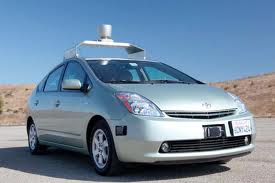I often pondered about ways to smooth out traffic patterns on our highways. It seemed to me that the greatest problem was people not moving at the same, consistent pace.
 |
| Courtesy Google Images |
You know what I’m talking about; it’s rush hour and traffic backs up because there’s all these ramps spewing cars that are trying to merge onto the thoroughfare. Drivers have to slow down to allow cars in; or they make lane changes to avoid the incoming vehicles; everyone’s tapping their brakes, which creates a ripple effect that cascades back through traffic, sometimes for miles (ever been on the Mass Pike on Easter Sunday?). I don’t even want to talk about the effects of an accident; a fender bender during a busy time creates chaos!
I wondered if there could be a system that would take over a car’s driving functions as that car entered a limited access roadway. In my fantasy system, once a driver entered an onramp, a master computer took control, merged traffic and moderated speed.
We already have cars that can park themselves (
2012 Ford Focus).
Chrysler minivans have a feature that warns the driver if another car is in its blind spot.
Google has taken it to the next level. They have developed a car that is driverless.
The Washington Post reports the car, based on a
Toyota Prius, has driven over 250,000 accident free miles and has been licensed for use in Nevada.
CNN Money reporter,
Peter Valdes-Dapena , details a ride through a predetermined route in Washington, DC.
Valdes-Dapena writes that the Google car handled unexpected occurrences, such as avoiding a collision, on its own. Currently, a pair of engineers is required to sit in the front seat to monitor the vehicle’s operation, but their input is limited to operating the turn signals.
Not to be outdone, according to
The Telegraph,
General Motors has announced that self-driving cars will be available within a decade.
I am fine with the prospect of being able to just sit back and let the car do all the work. What do you think; are you ready to give up your control behind the wheel?



